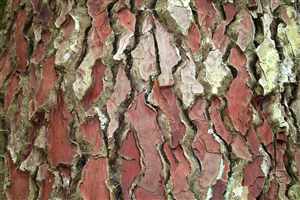French maritime pine tree (Pinus maritima)
Main Facts about French maritime pine tree

Using French maritime pine tree
Recent studies show that French maritime pine bark may be an powerful herbal remedy for diabetes, arthritis and viral diseases. Pine bark extract demonstrates antioxidant and anti-inflammatory actions. It increases the resistance of the small blood vessels and normalizes their permeability. Research indicates that maritime pine bark extract may help improve symptoms associated with chronic venous insufficiency (CVI), a syndrome that includes leg swelling, varicose veins, pain, itching, skin changes and skin ulcers. Pine bark extract, rich in polyphenols, helps reducing total cholesterol and LDL-cholesterol levels and is used to lower the risk and severity of heart disease, strokes, high cholesterol, and circulation problems. French maritime pine tree extract given in addition to diabetic and hypertensive medications may improve blood sugar and cardiovascular risk factors, and allow patients to lower antihypertensive medication. A recent study shows that Pycnogenol® may improve vision in people in the early stages of diabetic retinopathy. Pine bark tree extract is recommended for other eye conditions that are caused by blood vessel damage . Maritime pine bark is used as an herbal remedy for allergies and inflammations. In a 2008 study of 116 women (ages 18 to 48), researchers found that those prone to severe pain during menstruation experienced a significant decrease in pain and required less pain-relieving medication while taking Pycnogenol®. Pycnogenol® may be useful in the management of childhood asthma. According to a study published in 2004, after three months of following 60 children with mild-to-moderate asthma, those taking Pycnogenol® had significantly more improvement in lung function and asthma symptoms compared to study members assigned to a placebo. Some studies showed a significant reduction of hyperactivity, attention and visual-motoric coordination and concentration improvement in children with ADHD who took Pycnogenol®. Pine bark extract is recommended to improve the health and smoothness of the skin, including damage caused by overexposure to sunlight. Pine bark extract is a supplement used for anti-aging as well.Caution!
Pine bark extract is generally well tolerated, with minor stomach discomfort, dizziness, nausea, and headache occasionally noted. Pycnogenol® is generally considered safe, but it may interfere with the action of certain drugs used in chemotherapy and radiation therapy. Pycnogenol® may also cause irritability and lower energy levels, especially when used in treatment of ADHD.| Fo-ti |
Garlic
|